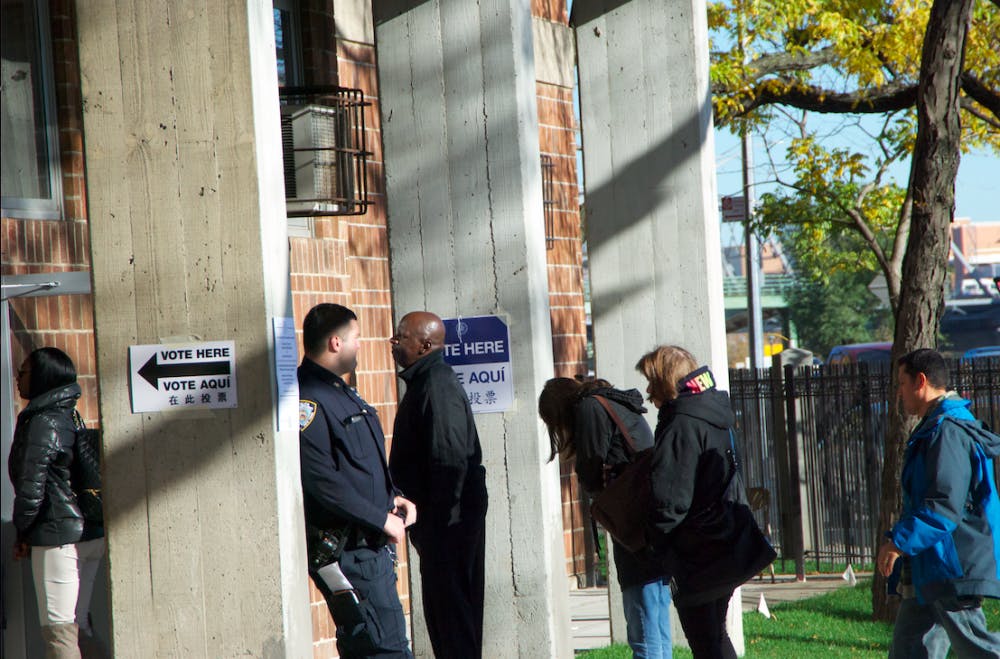HARLEM, NEW YORK — Danielle Jones' early morning jog route around the streets of Harlem today included a pit stop she doesn't take — a polling location.
Whatever heart rate she was monitoring on her iPhone app relaxed for a few minutes while she waited in line to vote, and afterward, she placed a sticker on her Nike sweatshirt to reaffirm to those who passed by that she committed her greatest American civic duty on Election Day.
The unusual blip in her day's routine was a vital one, but she admitted that her personal vote may not impact New York's Electoral College outcome. The state's outcome is practically decided. But for swing states scrapping for votes at the last minute — particularly North Carolina — Jones, a 29-year-old African American, said she wants to be an example to her fellow Millennials and minorities.
"I would tell Millennials in North Carolina that they have to sit and really think about he future that they want," Jones said. "A lot can happen in four years, and when they get out of college, the landscape they enter will be from a direct result from who is elected president today."
Jones had some harsh words for Republican nominee Donald Trump, who she said singlehandedly divided the country with his coarse rhetoric ver the past year and a half. But that mindset is typical in the New York.
The last time a GOP Presidential candidate won New York's 29 electoral college votes was 1984 with Ronald Reagan's second term.
A reason for the Democrats' nearly three-decade embargo on New York is mainly the younger generation. About 1.6 million Millennials live in New York alone. As seen with the Bernie Sanders primary campaign, Millennials are beginning to thrive in the political process.
But in North Carolina, a state with Southern conservative roots but a rapidly growing college scene, ideologies are clashing, and the state is a toss-up.
The latest Elon Poll has Democratic nominee Hillary Clinton currently edging out Trump by 1.2 percent. Unlike New York, North Carolina's state's outcome isn't conclusive. Until 2008, North Carolina had voted Republican for 32 years. President Barack Obama's unprecedented capture of the state then was cemented by the participation of two groups — Millennials and African-Americans. According to analysis by the Pew Research Center, Obama's campaign reached 46 percent of Millennial voters in North Carolina compared to Republican John McCain's 29 percent. On the national scale, 95 percent of African Americans voted for Obama and 66 percent of voters aged 18-29 voted Democratic.
Josh Bordan, a 23 year old black man, casted his ballot in the same Harlem site as Jones, which was located in a predominantly black neighborhood. While he was hundreds of miles away, he told North Carolinians to repeat history and proclaim their voice — especially for young minorities.

A sign using multiple languages directs voters in Harlem. Photo by Emmanuel Morgan
"It's important that our generation realize that we as Millennials have power and can make a lot of noise," Bordan said. "Regardless of the way you feel about the current state of our country, the only way you can have leverage in this discussion is if you vote.
"Even if you don't agree with the stance of both of the candidates, no change is going to come if you don't exercise your American right."
The ability to exercise that right was controversially debated in North Carolina this year. The Supreme Court recently banned a voter registration law in North Carolina that "targeted African-Americans with surgical precision." Because they both voted in a neighborhood that had a large minority population, they said this election is important not only for North Carolinians, but the country as a whole as a statement to show their prowess in the political spotlight.
"Systematically, politicians have a way to make voting hard for minorities," Bordan said. "This time around, we are in the majority, and we have a chance to make our stamp for the future."
Many electoral college predictions still favor Clinton to win, but the field can drastically shift if Trump snags North Carolina. Borden hearkened back to Obama's campaign and how impactful Millennials were. He admitted that this election may be different and that people may not be as excited as when Obama ran, but he said the stakes are too high in this election for people to be turned off by the tense atmosphere.
Latest Electoral College prediction by LA Times as of Nov. 7.
"When you look at why we should vote, all you have to do is look back to four or eight years ago and see what we did," Bordan said. "This election could really be a tipping point for years to come, so we have to show out and vote.


